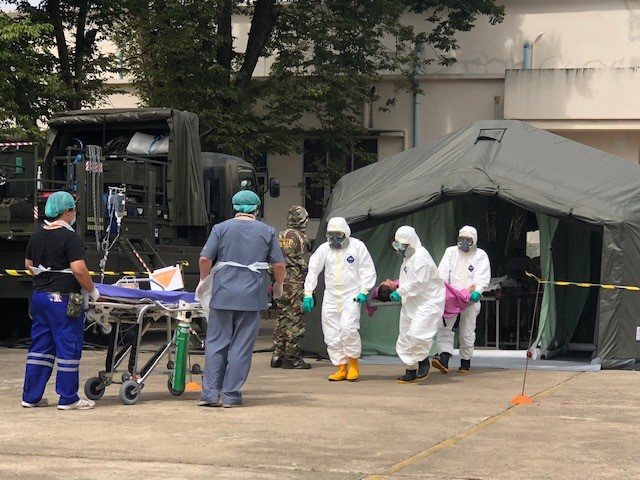
The challenge to protect global communities against deliberate health threats is being tackled by Flinders University experts, with assistance from the Canadian Government.
The Torrens Resilience Institute, based at Flinders University, has been awarded $921,977 for a new three-objective program, to work in partnership with the Weapons Threat Reduction Program at Global Affairs Canada to devise new tools and intelligence responses.
Matthew Flinders Distinguished Professor Paul Arbon, the Director of the Torrens Resilience Institute, will lead the project, which will be managed by Dr Rebecca Hoile – an international bioterrorism expert who has previously headed Chemical, Biological and Radiological Sub-Directorate preparedness and prevention at Interpol in Lyon.
Recent incidents involving the deliberate use of Chemical, Biological, Radiological and Nuclear (CBRN) materials have occurred in Iraq, Syria, the United Kingdom, Malaysia, America and elsewhere.
This adds to growing evidence that criminal and terrorist individuals and groups are successfully acquiring materials and precursors for the production, trafficking and potential use of CBRN materials and agents, and intend to use biological pathogens and toxins to cause harm.
Such threats have prompted a higher level of responses to problematic biological events – and Flinders researchers will be working at the forefront of these important developments.
“During discussions with the sector, it was identified that strengthening the detection of suspicious biological events at the field level were needed across the health and security interface,” says Professor Arbon. “This includes increasing access to resources to assist in identifying what constitutes a potential deliberate event and actions to address the challenges of a deliberate incident.
“These recommendations form the basis of Project LINK and we welcome the opportunity to work with our colleagues internationally in building resilience to events of this nature.”
Project LINK comprises a set of activities designed to reduce the impact of CBRN incidents and mitigate the global health security risk by addressing the need for improved coordination and enhanced tools for health security responses to deliberate incidents.
The new Torrens Resilience Institute project will deliver three outcomes:
- An improved CBRN intelligence database, based on international data regarding threats, incidents and trends.
- Developing improved coordination of response agencies and governments within the region.
- Developing a portable ‘in-field’ tool for health and veterinary services.
Dr Hoile, currently based at the TRI at Flinders Bedford Park and former head of the Bioterrorism Prevention program at Interpol, is committed to improving the health security interface.
“Today’s global counter terrorism environment requires innovative methodologies and resources to better respond to threats and acts involving the deliberate use of CBRN agents,” says Dr Hoile.
“The vulnerability remains as efforts to increase biosecurity and suitable education continue. Project LINK will provide an opportunity to continue building resources required to combat this issue.”
Since its establishment in 2002, Canada’s Weapons Threat Reduction Program (formerly known as the Global Partnership Program), has delivered more than $1.3 billion (CAN) in programs to mitigate threats posed by Weapons of Mass Destruction.
The Program works with partner countries, international organisations and non-governmental organisations on projects aimed at preventing weapons and materials of mass destruction from falling into the hands of terrorists and states that harbour them.
It implements Canada’s obligations under the G7-led Global Partnership against the Spread of Weapons and Materials of Mass Destruction.
The Torrens Resilience Institute was established at Flinders University in 2009 to support organisations and societies in their ability to respond to disruptive challenges that could potentially overwhelm local disaster-management capabilities.






